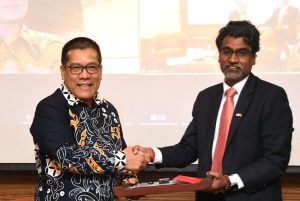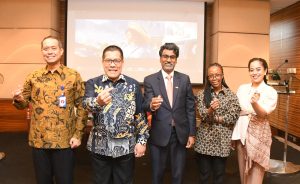
JAKARTA- At the beginning of 2023, The National Population and Family Planning Board of the Republic of Indonesia (BKKBN) is bringing back the Ambassador Talks activities with the South African Embassy. On this occasion the Deputy for Training, Research, and Development, Prof. Rizal Damanik, PhD, who represented the Head of BKKBN Dr. (HC) dr. Hasto Wardoyo, Sp. OG (K) expresses his deepest gratitude to the South African Embassy for Indonesia and the Republic of Indonesia Embassy in Pretoria, as well as the South African Department of Social Development for their participation and contribution to the knowledge-sharing webinar.
“This is such a noble moment and I would like to deliver my warm greetings on behalf of the Republic of Indonesia’s National Population and Family Planning Board or BKKBN at the “Ambassador Talks” event to share policies, programs, and best practices between the two countries in the field of Population, Family Planning, and National Development”, said Damanik when opening the “Ambassador Talks with the South African Embassy” at the Grand Hyatt Hotel, Jakarta. This event was also held virtually via zoom and Live Youtube @BKKBNOfficial 08/02/2023.
“In the meantime, the younger generation is slowly starting to dominate Indonesia’s population. This will peak in 2025-2035 due to a demographic bonus in which the number of productive ages will significantly outnumber those of other age groups. As a result, the Indonesian country must train this young generation to be a superior generation that will lead and advance the nation towards Golden Indonesia,” Damanik added.

“BKKBN then emphasized the significance of globalization in addressing global issues such as population growth and development. As evidenced by our nomination for the 2022 UN Population Awards, Indonesia won population issues as a main drivers of development. In accordance with South-South and Triangular Cooperation, the BKKBN is willing to encourage collaboration and exchange best practices with other countries. Additionally, the Indonesian G20 current president last year used the theme “Recovery Together, and Stronger,” which aims to develop a strong and inclusive global recovery that strengthens collective achievement of the 2030 Agenda, emphasizing inclusivity and resilience “Damanik highlighted.
On the same occasion, Vickesh Maharaj, Charge d’Affaires Embassy of South Africa to Indonesia responded in his remarks, “The South African government is committed to strengthening the service delivery of family training programs and government policies and promises to prioritize and strengthen family planning services, emphasizing that protection standards for public health workers as best they can to promote family planning.”
Furthermore, Africa is dedicated to implementing the School of Health Program, which provides reproductive health information and rights for girls. There are also policy programs that need to build on the strengths of the family and it’s a challenge to ensure that families are empowered.
“I hope that the collaboration between Indonesia and South Africa in these various aspects, as we have seen in previous programs, will have a very similar path in ensuring that we develop standard operations on family planning and resource management,” Vickesh hoped.
Meanwhile, Victor Josef Sambuaga, Charge d’ Affaires of the Embassy of the Republic of Indonesia in Pretoria, South Africa very much welcomes the initiative formed by the BKKBN, as this will be the first involvement of issues related to the second Population and Family Planning organization country. “Many countries in the world, especially those that are still under development, are facing population and family planning situations, including South Africa and Indonesia. These are the two keys to having a strong and healthy society, which is the foundation of a strong and prosperous nation,” said Victor.
Victor continued, “According to the most recent census in 2022, South Africa reported a total of 60.6 million people, while Indonesia registered 270.20 million individuals based on the previous census in 2020. This graph demonstrates that the two countries’ primary focus on population concerns may differ.”